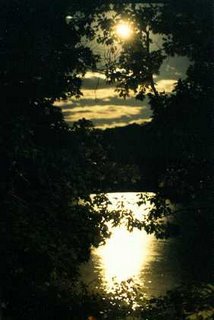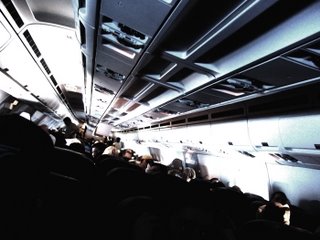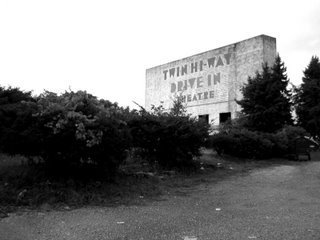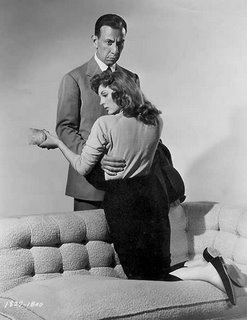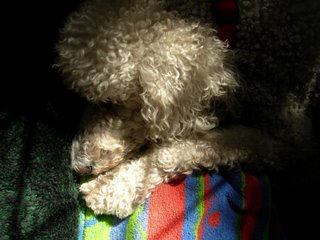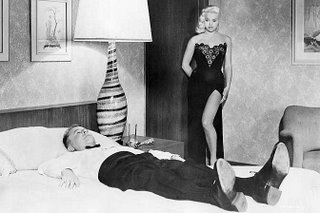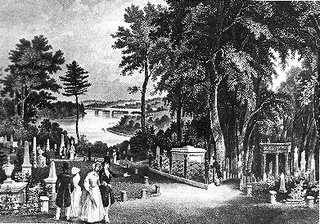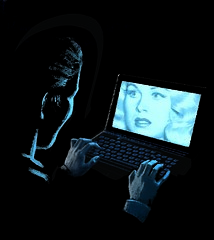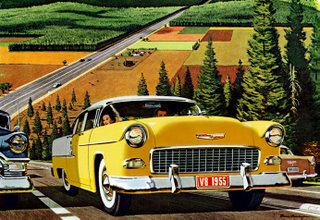
Mr. Barbicane looked at his breakfast consisting of scrambled eggs, four slices of crisp bacon, a toasted English muffin with an assortment of jams and jellies and felt ill at ease. His state of vague dissatisfaction came not from the food in front of him, but from the experience he had in the bathroom shortly after stepping out of his shower. An experience he found difficult to explain and impossible to shake.
He had turned off the water, stepped out of the shower and had begun to dry himself with the white hotel towel. The room was cloudy after the shower and the expanse of mirror over the vanity was a vague, misty square through which Mr. Barbicane could make out his movements across the bathroom. He wrapped the towel around his waist and moved to the sink in preparation to brush his teeth. Reaching for his toothbrush inside his travel kit he noticed the hot water had loosened the band-aide around his index finger. Mr. Barbicane pinched the exposed edge of the bandage between his fingernails and pulled it off his finger. Underneath he found his skin pale, the thin slice of the cut still visible.
And in that moment something from his forgotten dream bubbled up inside him. It was unable to bring Mr. Barbicane any of the specific, albeit unorthodox, narrative of the drive, the cemetery, the coffin, the fall down the hill and the rest of it, but it was able to communicate some of the unformed sadness, the despair the dreaming Mr. Barbicane experienced upon seeing the flesh under the band-aide. The waking Mr. Barbicane now felt surprised by a welling up of inconsolable loss, somehow triggered by the sight of his wounded finger. He had a sense that something had happened to him, that he had experienced something, something he couldn’t reconstruct, but something that had dissembled him in a basic and irreparable way. He stood there in the bathroom, staring at his finger trying to remember. The towel came lose from his waist and dropped to the floor. Mr. Barbicane didn’t notice. He just stood there, naked, looking at his finger, trying to understand, trying to figure out why he felt so suddenly empty. He stood there for what felt to him a very long time, then he left the bathroom, dressed quickly and dashed out of the hotel room, as if to leave the dark feelings behind.
But the feelings came with him. They rode down to the lobby with him in the elevator and walked past the reception desk and into the bright restaurant with its picture windows offering the panorama of parking lot and access roads. A waitress named Claudine took his order although he felt no appetite.
Mr. Barbicane looked around the room and saw perhaps fifteen other people, some in couples, most sitting alone over their breakfasts and coffees, some with newspapers, some with laptops already open and ready for business. Among this number was Lloyd Barton who, like Mr. Barbicane, scanned the others in the restaurant.
Although he didn’t know it, Mr. Barton was looking for Mr. Barbicane, in that he was trying to guess if the person who made the passionate noise in the room next to him was in the dining room. He was looking for men with a particularly satisfied look on their faces, so when he saw the distracted expression on Mr. Barbicane’s face he immediately checked him off the list of possibilities and continued to search the room.
Claudine returned with Mr. Barbicane’s breakfast along with complimentary hot coffee and Mr. Barbicane was pleasantly surprised to find the aroma of the food brought back his appetite. He started to eat, all the while still plucked by the indefinable experience he’d had in the bathroom.
Eventually he chalked it up to the wistfulness of the journey winding down. He would finish breakfast, go up to his room, pack, check out, then pick up his rental car and head east. Once the rental car contract was signed the only part of the trip left (before the return loop) would be checking into the motel close to where he was expected.
In a few hours he would arrive at his final destination, a place where things would be expected of him, things more complex than his compliance with federal regulation as regards to tampering with lavatory smoke detectors during flight.
By the time he finished his meal he had almost convinced himself that the sadness he felt, although sadness did nothing to indicate the scale of what he’d felt, was related to nothing more than approaching a journey’s end.
And really, there was the return to look forward to. Another trip altogether! All the steps needed to take him back to his car patiently parked by the runway in Burbank. There would be business to take care of, matters that needed his attention, duties to fulfill, but they could be dealt with more easily if he stayed focused on the comforting fact that at the end he would once again take on the mantle of passenger, that he would be able to drop back into that blissful status of no longer being a person, but of being simply a confirmation number.
He tried to convince himself that such positive thoughts had braced him enough for the tasks of the day.
With breakfast finished he returned to his room and prepared to leave. He had taken little out of his suitcase except the fresh clothes he was wearing and his travel kit. Yesterday’s shirt and underwear were placed in one of the hotel’s laundry bags and tucked into a corner of the case. He folded his jacket and pants and placed them in the bag along with his kit. He then closed his suitcase. Mr. Barbicane put the unopened can of Diet Coke in the outer pocket of the case then sat on the edge of the bed to finish the ice tea he’d opened earlier.
According to the clock radio it was 10:43 A.M., more than an hour before check out time. Mr. Barbicane intended to leave once he finished his tea so he was in no danger of overstaying his reservation.
His tea finished, Mr. Barbicane used the bathroom one last time, washed his hands, then made a final check of the room, looking in closets he had not previously opened, checking drawers he had not used, as if his possessions might have unpacked themselves and hidden in the room during the night or while he was downstairs having breakfast. There was nothing of his in the closets or the drawers. No one would ever know Mr. Barbicane had been there.
Mr. Barbicane took hold of the handle of his ruthlessly practical rolling carry on bag and went to the door. He opened it, stepped into the hallway and paused to look back into the room, back into all that comforting uniformity, all that undemanding anonymity. It called to him. It offered protection. And he longed to answer that call.
But he had miles to go before he would sleep again in another room so similar, but not the same room. Never the same room again.
He pulled his bag across the threshold, let the door close and was moving down the carpeted hallway when he heard the door sigh shut and click behind him.
There was, as Mr. Barbicane expected, a different Hyatt employee at the desk when he stopped there to check out. He handed his plastic key card to the young woman. This was now a symbolic act, the returning of the key. The information that made the card a key, that communicated with the sensors in the individual door locks, was all stored on the magnetic strip on the back of the card. When Mr. Barbicane checked in, the key became his key when it was passed through a special machine the size of an electric pencil sharpener and sitting on the reception desk. Since the hotel computer knew when Mr. Barbicane was supposed to leave, the information on his key was set to expire at the appropriate moment. After that the key card would be useless. It would not open the door to the room that had been Mr. Barbicane’s, or the room next to his, which was still occupied by Mr. Barton, or any other door in the building. So it really didn’t matter if Mr. Barbicane returned his key or forgot to return it or simply kept it as a souvenir; it would no longer be a key.
Still, Mr. Barbicane returned the key card. The young woman checking him out of the hotel opened a drawer in the counter in front of her and tossed the card into the confusions of other such cards waiting to be re-coded and returned to usefulness.
Once keys in hotels were made of metal. They were usually attached to plastic fobs, usually in the shape of a distended diamond. Before they were made of plastic they were made of pressed cellulose or bakelite or metal or in some cases wood. They would have the name of the hotel embossed on them in some way as well as the number of the room to which they would permit access.
You carried these keys around in your pocket while you were visiting an unfamiliar city. It would take up space in your pocket, this awkward shape clicking up against your own keys, keys to things you were far away from. They served to remind you that, stranger though you might be, you had a place in this city. A very specific space. Not only an address, but a room location.
Now hotel room keys do their best to help you remain anonymous in a different city. The intention, at least in part, is to keep you safe: If you lost one of the old style keys the finder would have immediate access to your room and any belongings you might have left behind when you exited in the morning to attend an important meeting or perhaps just to see the sights. But these blank pieces of plastic, while they may reveal your choice of hotel, would be mute as to the place in that building where your toothbrush was.
A copy of Mr. Barbicane’s bill was printed and handed to him for examination and approval. He had not used room service nor made any local calls. He had paid cash at the restaurant when he had breakfast and had no use for any additional services such as dry cleaning or in room massage from an employee of the hotel’s fitness center. So there was nothing on his bill except the charge for his single night’s stay and applicable taxes.
He told the young woman the bill was in order and, yes, he would like to leave the charges on the same credit card he had used when he arrived. Mr. Barbicane signed the credit card form and the bill and was given copies of each, which he took, folded and placed in his pocket. He then turned and left the hotel, crossing the lobby and going up the ramp to the moving walkway waiting to carry him back to the terminal.
Sun poured down on Mr. Barbicane as the endless rubber tread of the walkway pulled him toward the terminal. It came down on him from the glass ceiling of the structure containing the walkway and reminded Mr. Barbicane of how long he’d been in the travel tunnel.
He stepped off the walkway at the terminal end and went downstairs to the level where various forms of ground transportation were arranged. There he found the counter for the rental car agency he had chosen for his needs and began a process very similar to the one used to check into the hotel, but in this instance also requiring the presentation by Mr. Barbicane of his driver’s license.
The transaction went smoothly and Mr. Barbicane was handed a folder containing his rental contract, a useful area map, and the keys to a 2006 Ford Fusion. He was told he would find the car that fit the keys in the rental car agencies special parking area directly across from the main entrance to the terminal. He would find the way clearly indicated by signs incorporating the rental agency’s logo and corporate colors.
Mr. Barbicane thanked the agent, who was male, aged twenty-six and named Brett, took the folder and his suitcase and went to the automatic doors of the terminal.
The doors opened ahead of Mr. Barbicane who stepped out into the real world for the first time since he entered the travel tunnel by boarding the first MD-87 in Burbank. He was immediately aware of the difference, of how the air smelled and moved, how the light was different, how, in spite of the municipal architecture all around him, unstructured it all felt. And there was more sound. It was disturbing and disappointing after such an extended period of living in a controlled environment.
Mr. Barbicane pushed on. He went to the curb and obeyed the traffic signal, which helped him cross the access road and enter the parking structure on the other side. There he found that the signage he had been promised would help him locate his car was in fact as helpful and clear as he had been led to believe.
In a matter of moments he located the parking slot the number of which corresponded to the number printed on his rental folder form with a Sharpie by young Brett. The slot contained a cherry red Ford Fusion, a mid-size sedan with more chrome accents than any other car in its class based on the amount of standard and available exterior chrome accents in a mid-size sedan.
The Fusion has a Duratec 2.3 liter, 16 valve I4 engine capable of delivering one hundred and sixty horsepower (at six thousand two hundred and fifty revolutions per minute) with an Environmental Protection Agency fuel rating of twenty-three miles per gallon for city driving and thirty-one miles per gallon when driving on the open highway. The automobile Mr. Barbicane was renting had direct acting mechanical bucket valve lifters and a sequential multi-port electronic fuel injection system. It had a double balljoint SLA front suspension and a multilink independent rear suspension that employed stabilizer bars for increased comfort and control. Mr. Barbicane had accepted the car with a full tank of gas and was expected to return the car with the same amount of fuel as when he left.
Mr. Barbicane pulled on the handle of the driver’s door and found it unlocked as was the rear passenger door, which he opened in order to put his bag on the back seat. Then he folded himself behind the steering wheel, closed the driver’s door, put the key in the ignition, and started the car.
He was instantly assaulted by a chest pounding blast coming from the sedan’s Premium Sound System with in-dash six-disc CD/MP3 changer. Mr. Barbicane desperately searched the dashboard for the sound system’s controls while
Between Me and You performed by Ja Rule (born Jeffery Atkins in Hollis, Queens on February 29, 1976) with guest vocals by Christina Milian, one of the hits of his second album,
Rule 3:36, assaulted his senses. He found the volume and turned it down. This did not help his appreciation of the music and he turned the system off completely. He’d worry about selecting alternative radio stations once he’d driven off airport property.
Mr. Barbicane buckled his seatbelt, adjusted the side-view and rear-view mirrors as well as the angle of the steering wheel, then pulled the car into drive and started to follow the arrows painted on the floor of the garage which he was promised would take him out of the parking structure.
There was a brief inspection of his rental agreement by a uniformed guard at a gate guarding the exit from the parking structure. The guard checked the stated level of the gas tank against the level shown on the dashboard gauge then handed the rental agreement folder back to Mr. Barbicane and pushed a concealed button inside his small toll-booth of a guard station thus opening the gate and permitting Mr. Barbicane to leave the parking structure.
He drove the sedan out of the parking structure and into the Pennsylvania morning. For the first time in more than twenty-four hours, Mr. Barbicane was at the wheel and in command. He watched the signage on the airport loop road carefully and merged onto Route 60 South.
He switched to I-79 south in order to bypass Pittsburgh proper. This choice lengthened the actually mileage of the last leg of Mr. Barbicane’s trip, but it would permit him to complete it in less time. He drove south through Collier and South Fayette where he decided to try the radio again.
Mr. Barbicane touched the on-off button tentatively.
A voice on the radio told him:
You niggaz got me fucked up, it's time to go to war
Nigga so what's up, I bust up, any muh'fucker feelin he rougher
I can't get enough of, showin niggaz what time it is
Go inside his crib, find his kids 'til we find the shit
Go ahead and keep buyin shit, act like you run the town
On the worst day, your birthday, that's when I cut you down. Mr. Barbicane stabbed the scan button on the tuner, silencing Young Buck and Rizin Sun. The radio then set about the orderly task of shifting through the available stations, stopping each time it found a strong enough signal and giving Mr. Barbicane several seconds to decide if this was a station he would like to listen to. If so, he would push the scan button again and the radio would stay tuned to the selected frequency. If not, the radio would go on to the next signal in the spectrum.
In this way Mr. Barbicane heard the local radio market in a series of arbitrary snapshots; snatches of songs and commercials and commentators. The brief stops usually contained no real information leaving Mr. Barbicane to decided based on a tone of voice more than what the voice might be saying, on the energy of a song instead of its lyrical content.
Nothing caught Mr. Barbicane’s ear and he left the radio on scan for several minutes before he turned the machine off and drove on with nothing but the sound of the car and the highway as company.
The countryside Mr. Barbicane drove through was once a whispering forest of oak and hickory, birch and sugar maple, black cherry and hemlock, home to Elk and Whitetail Deer. Now flat boxy buildings crowded the near horizons of the valleys he drove through. This was now a place of light industry and discount saving centers.
We are so used to seeing so much of our country looking like this that it seems natural, as if the six lane highways were always there and then someone came along and merely added the stores, the E-Z On and Off gas stations and the McDonald’s with their sin absorbing Big Macs.
Mr. Barbicane drove on, past Houston and Chartiers to South Strabane where he transitioned to the east bound 70. Now the industrial parks and shopping centers started to fall away and he was driving through what was once farmland.
He was getting closer. This fact did not produce happy anticipation, but rather created a sense of foreboding buried in his stomach, like the early signs of the phantom pain he was so afraid would some day fell him in a hotel room a thousand miles from home.
Past the cut offs for Bealsville and Fallowfield, on through Allenport and Dunlevy heading for Rostraver and New Stanton. And with every passing mile the discomfort grew until he noticed that it had ceased to be like the phantom pain, and was becoming the pain, the actual suffering he so dreaded. He realized he was hunched forward in the driver’s seat, almost doubled over the steering wheel as he drove. It felt like something was twisting inside him, turning on itself, knotting itself somehow.
It had come for him, not in the comfort of a hotel room or an airplane, but behind the steering wheel of a rented Ford, rappers spewing obscenities from the stereo speakers all around him. And he was so close to where he was going, so close to where he was ultimately expected.
He would push on. He would make the effort, find some reserve of untapped inner strength and complete his journey.
It was at that moment of fortitude and self-determination when Mr. Barbicane saw the farm stand.
It was a large, long, open sided shed sort of building with rows of produce and a large display of sweet corn and gallon jugs of cloudy apple cider placed close to the roadside. There were hand painted signs announcing the availability of Jams and Jellies and Candy Apples as well as Pumpkins. And in front of the establishment, right at the edge of the road, was a big Franklin stove painted red, clearly connected to nothing. There was a jug of cider on top of the stove, an additional indication that this was not an operating stove, but one used as some sort of rustic advertisement.
Mr. Barbicane was staring at the Franklin stove when his tires started drifting onto the shoulder of the road.
